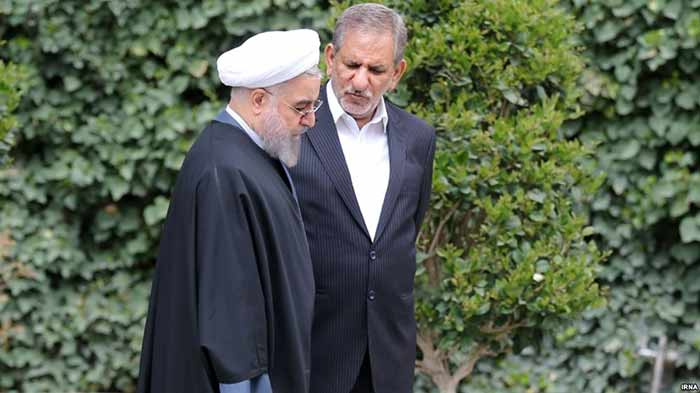Vice President Jahangiri to Run beside President Rouhani in Election, Defending and Fending for Him

Minutes before the registration window for presidential hopefuls was closing, Vice President Eshagh Jahangiri unexpectedly arrived in the Interior Ministry to file for the May 19 presidential race. He attended a press conference immediately after registration, emphasizing to the reporters that he had made the decision in coordination with President Hassan Rouhani.
The Vice President did not hide that he had made up his mind to run upon insistence from some ‘Reformist friends and figures’. He openly said that President Rouhani was the main contender and he was there just to defend the administration.
His upset candidacy has stirred the one-sided lineup of Principlist hopefuls, whose only goal in common seems to block Rouhani’s reelection. The move has sparked a debate in which both sides agree on its significance.
In an op-ed published by IRGC-affiliated Tasnim News Agency, commentator Abdollah Abdollahi has put forward four reasons for Jahangiri’s surprise registration. Among other reasons, he argues that Jahangiri’s position in the Rouhani administration makes it less likely for him to be able to join critics, when compared with an independent Reformist candidate.
The politics section of Principlist bellwether Kayhan daily printed an article that interpreted the notion of a ‘cover candidate’ for Hassan Rouhani as a sign indicating the Rouhani administration’s ‘empty portfolio’. Through selective quotes made by different Reformists against introduction of a cover candidate, the article tried to assert that the turn is a manifest evidence that the pro-reform camp considered Rouhani not strong enough a candidate to defend his own dossier. Calling Vice President Eshagh Jahangiri a “fender candidate”, the Kayhan article moved on to quote from pro-reform Shargh daily, which had reported that the decision for him to run was a reaction to the all-against-one line-up in the Principlist camp. Kayhan daily concluded that Jahangiri’s candidacy not only revealed the true measure of conceited Reformists whose ultimate policy in the race would be to introduce a fender candidate but also demonstrated that Rouhani was the likeliest president in the history to lose a bid for reelection.
Shargh daily’s article, quoted by Kayhan and headlined “Two by Two Duel reads: “The mainstream election line-up has now emerged with the Rouhani-Jahangiri duet competing with the likely duet of Raisi-Qalibaf”. Drawing on the theory that Qalibaf would act as a catalyst for Raisi during a campaign mainly focused on attacking Rouhani and Tehran mayor would withdraw in favor of Raisi to assume vice presidency under his administration, the article argued that Jahangiri’s involvement could be the smartest means for the showdown waiting for Rouhani, particularly during live state TV debates. The article then recounted Jahangiri’s nomination speech, where he vowed to explain everything from the scratch and defend the administration’s performance. After a brief account of Jahangiri’s political records, Shargh moved on to entertain the idea that in the wake of Ayatollah Hashemi’s demise, Jahangiri serves as the main go-between between the Reformist camp and the Supreme Leader, a further sign of his increasing weight in Iran’s domestic politics.
The pro-reform camp actually came out after Jahangiri’s registration. In an interview with state-run Iranian Students News Agency (ISNA), Reformist politician Hossein Mar’ashi said the camp’s electoral high council had chosen to use the presidential race as an opportunity to give publicity to pro-reform figures, while it continued to support Rouhani as its main candidate. Mar’ashi told ISNA the decision aimed to make the Reformists’ voice better heard and pave the ground for an independent campaign in 2021. It was also a preemptive move for unexpected cases he added, a reference to rumors that the Guardian Council might consider disqualification of sitting President Hassan Rouhani. Jahangiri was picked from a shortlist of five, including Foreign Minister Javad Zarif, Petroleum Minister Bijan Zanganeh, former energy minister Habibollah Bitaraf, and former healthcare minister Reza Malekzadeh, according to Mar’ashi. The shortlist was consulted with Reformist heavyweights Mohammad Khatami, Mohammad Mousavi Khoeiniha, and Mohmmadreza Aref, he stated. The final word was of course given to President Rouhani himself. Mar’ashi also said the move was basically recommended by Ayatollah Hashemi Rafsanjani.

